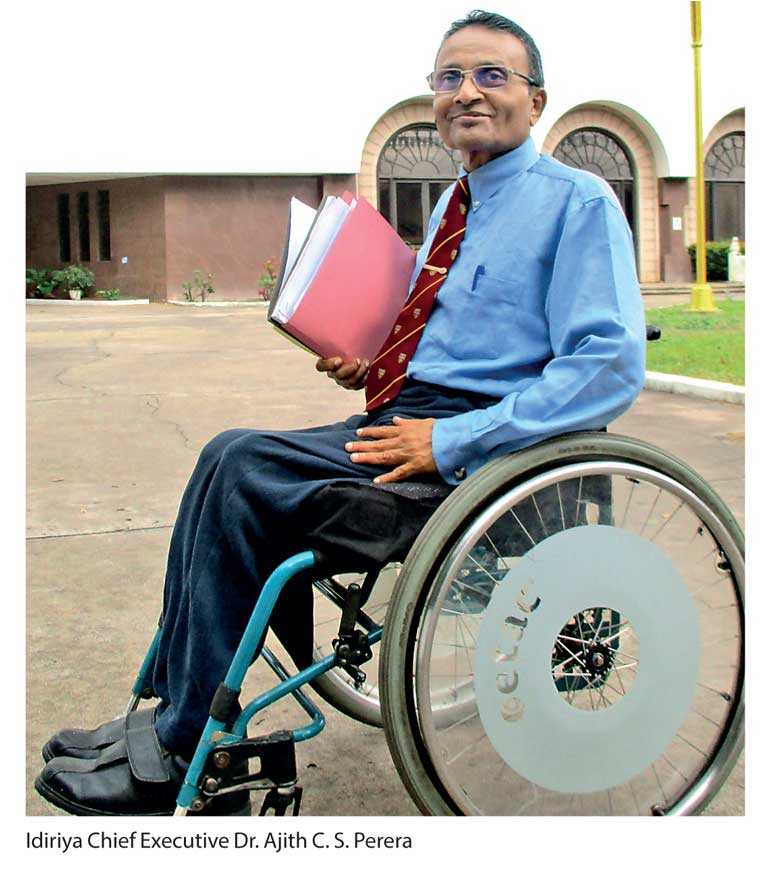Wednesday Feb 25, 2026
Wednesday Feb 25, 2026
Wednesday, 10 October 2018 00:00 - - {{hitsCtrl.values.hits}}
 Poor implementation of Apex Court Order 221/2009
Poor implementation of Apex Court Order 221/2009Idiriya Chief Executive Dr. Ajith C.S. Perera has re-ignited a Public Interest Fundamental Rights Petition of national importance, in the Supreme Court.
Supported by an affidavit and testimonials from two eminent medical doctors, he has pleaded for the implementation of the law to ensure compliance with existing regulations on accessibility concerning buildings members of the public need to use in daily life, without further delay.
The petition was taken up last Thursday by a bench comprising Vijith Malalgoda and Murdhu Fernando.
The petitioner pleaded that the Supreme Court, in 2011, had directed 70 respondents that compliance with the existing laws is mandatory in order to issue the Certificate of Conformity for new buildings deemed necessary for public use in daily life.
Dr. Perera said that the Ministry of Social Services, on 17 October 2006, has promulgated a comprehensive, detailed set of regulations, approved unanimously by the Parliament, clearly stipulating design, space requirements, and safety measures, and thereby specifying the manner in which the parts identified in the accessibility regulations of new buildings shall be constructed.
Since 2011, the number of public buildings has proliferated. The petitioner pointed out that an estimated 20% of Sri Lanka’s population – the largest minority group of citizens – are of restricted ability.
He said that despite valiant renewed attempts over 12 years, and the granting of three extensions to the deadline, the implementation of the accessibility regulations and the Order by the Supreme Court has been poor.
He further said there is a growing urgent need to prevent obtaining the Certificate of Conformity in an evasive manner, without proper compliance due to the failure – wilfully or through negligence - of the respective regulatory authorities.
The petitioner stated that he filed a Public Interest Fundamental Rights Petition in 2009, under SCFR 221. Appearing at all times in person on a wheelchair, he then single-handedly and successfully pursued this application.
As reported in this paper in 2010 and again in 2011, this case was taken up on a number of occasions, with all respondents given time, over and over again, to file their views, objections and affidavits; discussed and argued over a month; and only then did the Supreme Court make an Order on 27 April 2011. This Order, directing the respondents to comply with the accessibility regulations, and stating it was mandatory to certify the buildings on completion and to issue the Certificate of Conformity in order to gain approval of building plans. It held that failure to comply with this Court Order shall be considered a serious punishable offence.
He said a total period of 11 years to comply in terms of the said Regulations had expired on October 16, 2017, with a further one year period having elapsed since as well.
The Petitioner states in the face of the rampant non-compliance with the accessibility regulations and an Order of the Supreme Court, an increasing number of people have become physically inactive, excluded from meaningful participation in economic and social life with equality of treatment and with dignity as fully-fledged citizens, pushing them towards poverty due to the loss of productive opportunities and potentially crippling their lives.
In spite of increasing physical hardship and several health-related issues, it has thus become incumbent on the Petitioner to re-agitate the invocation of the Fundamental Rights petition.
Dr. Perera is a well-qualified professional, with over 12 years of senior managerial experience. In November 1992, he was left instantly paralysed waist-down for life, from a grievous injury caused by a falling roadside tree. He has undergone formal training in the UK in the art of designing built environments accessible for all. With over 20 years of practical knowledge and wide experience as an accessibility consultant, he has voluntarily helped numerous organisations, including the Parliament of Sri Lanka. Since 1999, he has pioneered the campaign for ‘Accessible Sri Lanka for All’ through the intentionally accessible design of built environments.
As a national need, we believe the Government of Sri Lanka, perhaps as per Article 8 of the ratified UN Convention on the Protection of the Rights of the Disabled, will recognise and actively support such voluntary endeavours.